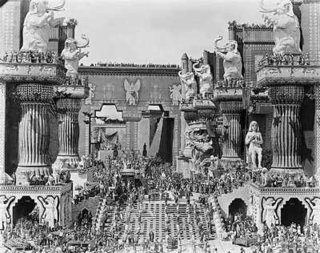Intolerance (movie)
|
|
Intolerance is a silent film directed by D.W. Griffith in 1916. The film, considered one of the great masterpieces of the Silent Era, was made in response to critics, who claimed that Griffith's 1915 epic The Birth of a Nation was racist.
One of the most spectacular films of all time, Intolerance was a colossal undertaking filled with monumental sets, lavish period costumes, and requiring more than 3,000 extras. The film consisted of four distinct but parallel stories that demonstrated mankind's intolerance during four different ages in world history. The timeline covered approximately 2,500 years, beginning with:
- The "Babylonian" period (539 BC) depicts the fall of Babylon as a result of intolerance arising from a conflict between devotees of different Babylonian gods.
- The "Judean" era (circa 27 AD) recounts how intolerance led to the crucifixion of Jesus.
- The French Renaissance (1572) tells of the failure of the Edict of Toleration that led to the St. Bartholomew's Day Massacre.
- Modern America (1914) demonstrates how crime, moral puritanism, and conflicts between ruthless capitalists and striking workers helped ruin the lives of Americans.
These stories are not told separately. Instead the film constantly cuts between them, setting up moral and psychological connections among the different stories. As the four stories progress toward their climaxes, the cuts become more rapid. Breaks between the differing time-periods are marked by the symbolic image of a mother rocking a cradle, representing the passing of generations.
One of the unusual characteristics of the film is that none of the characters have names. Griffiths wished them to be emblematic of human types. Thus, the central female character in the modern story is called The Dear One. Her young husband is called The Boy, and the leader of the local mafia is called The Musketeer of the Slums.
Actual costs to produce Intolerance are unknown, but best estimates are close to $2 million (around $33 million in today's dollars), an astronomical sum in 1916. The movie was by far the most expensive made at that point. When the movie became a flop at the box-office, the burden was so great that Griffith's famed Triangle Studios went bankrupt.
- Directed and written by D.W. Griffith
- Assistant directors: Allan Dwan, Erich von Stroheim, Christy Cabanne, Tod Browning, Jack Conway, Victor Fleming, W.S. Van Dyke, Elmer Clifton, Monte Blue, Mike Siebert, George Siegmann
- Cinematography: G.W. Bitzer and Karl Brown
- Editing: James and Rose Smith
- Original running time: approximately 8 hours
- Average running time of currently available copies: just under 3 hours
The cast was enormous and included:
- Douglas Fairbanks
- Lillian Gish
- Sam De Grasse
- Wilfred Lucas
- Mae Marsh
- Owen Moore
- Wallace Reid
- Constance Talmadge
- Natalie Talmadge
The film has been selected for preservation in the United States National Film Registry.
A detailed account of the film’s making is told in the William M. Drew 1986 book titled D.W.Griffith's Intolerance: Its Genesis and Its Vision.
External links
- Template:Imdb title
- Summary and discussion of the movie (http://www.filmsite.org/into.html) at Filmsite.org (http://www.filmsite.org/), a website about classical American moviesfr:Intolérance (film)

